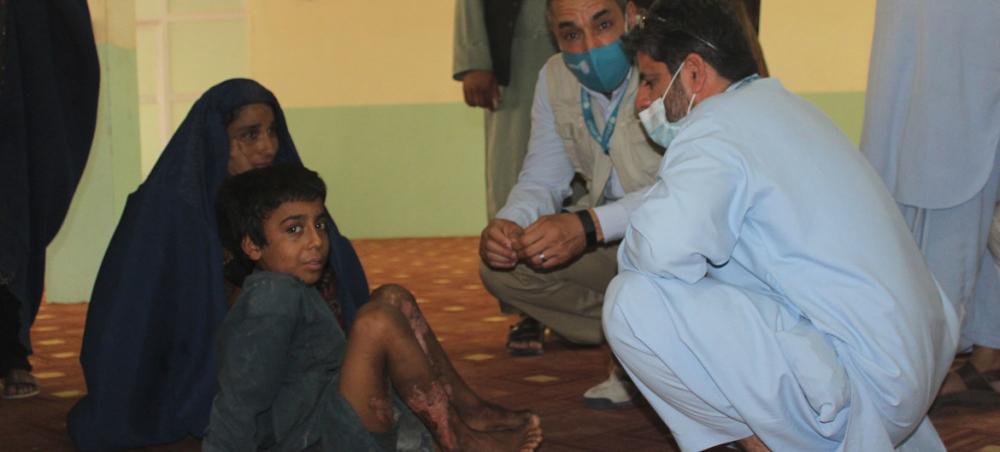Just Earth News | @justearthnews | 14 Aug 2021

Afghanistan
New York: Afghanistan is on course to witness its highest ever number of documented civilian casualties in a single year since records began, the UN refugee agency (UNHCR) said on Friday.
As widespread fighting intensifies, UNHCR said that it was particularly concerned about the impact of the conflict on women and girls as “80 per cent of nearly 250,0000 Afghans forced to flee since the end of May are women and children”, said spokesperson Shabia Mantoo.
“This is a staggering statistic,” Ms. Mantoo told journalists based at the UN in Geneva. “We need to raise the alarm about the disproportionate toll they are paying for what is happening on the ground.”
According to a report published last month jointly by the UN human rights office (OHCHR) and the UN Assistance Mission in Afghanistan (UNAMA), more women and children were killed and wounded in the first half of 2021 than in the first six months of any year since records began in 2009.
Echoing fears about the impact of the fighting on civilians, World Food Programme (WFP) spokesperson Tomson Phiri explained that the conflict “has accelerated much faster than we all anticipated and the situation has all the hallmarks of a humanitarian catastrophe”.
In a tweet on Thursday, the UN political affairs chief, Rosemary DiCarlo, said the Organization was "deeply concerned over the situation in the country: "One thing is clear from the country’s recent history: durable peace and development will not be achieved militarily. We're ready to contribute to a negotiated settlement."
More cities captured
According to latest reports, Taliban forces captured another three provincial capitals in the country's south on Friday and are gradually encircling Kabul. The insurgents now control more than two-thirds of the country, only weeks before the planned final withdrawal of US and international troops.
The latest US military intelligence assessment suggests that the Afghan capital could come under insurgent pressure within 30 days.
As widespread fighting intensifies, meanwhile, thousands of Afghans have fled their homes amid fears the Taliban would again impose a brutal, repressive government. The militant Islamist group ruled the country from the mid-1990s until the post 9/11 attacks US-led invasion, in late 2001.
Humanitarians are particularly concerned that the fighting is increasingly shifting to crowded urban areas, while UNHCR’s Shabia Mantoo noted that nearly 120,000 Afghans had fled from rural areas and provincial towns to Kabul province since the beginning of the year.
Child deaths rising: UNICEF
In an exclusive interview with the UN News French team, Mustapha Ben Messaoud, chief of field operations for the UN Children's Fund,UNICEF, noted there had been a "very significant increase" in child deaths in the past four weeks.
"One in two children under five suffers from severe acute malnutrition. They are extremely hungry, to the point of being ill. Today we have camps that are being set up, with no access to clean water and hygiene, and for us, that means the risk of cholera or diseases that can spread."
He said the current wave of COVID-19 infection, was "killing 100 people a day...We have at least 2,000 cases that are positive a day, and these are just the cases that are counted."
Alongside conflict and drought, he noted that multiple crises were hitting the most vulnerable hard. "Bombs don't discriminate, they fall on women, children, the young...the elderly. This also means that we will probably have a population that will try to reach Iran, Turkey and Europe", he added.
The UNICEF official compared the situation to height of the Syria crisis, and noted that he was at least happy to see two European nations vowing not to forcibly repatriate Afghan citizens, since fighting escalated.
Seeking shelter
The increasing number of civilians seeking shelter in towns and cities meant that “a growing number …do not have a place to sleep”, said Jens Laerke, spokesperson for UN humanitarian coordination office, OCHA. “Normally they would go to family and friends for shelter, but this is no longer the case.”
A spike in trauma cases has also been reported, aggravated by the recent escalation in violence. According to the World Health Organization (WHO) healthcare centres have seen a 30 per cent increase in patients compared to last year, with numbers almost doubling in the last two to three months, said WHO spokesperson Fadela Chaib.
The fighting has also created new challenges in reaching communities in need of food assistance around the country, warned the World Food Programme (WFP). “Aid workers are working under extraordinary circumstances,” said spokesperson Tomson Phiri, who noted that 18.4 million people already require humanitarian assistance, while the conflict has displaced up to 390,000 people this year alone.
In the last three months, WFP has provided food and nutrition assistance to 4.1 million people, Mr Phiri said, but this is not enough.
UN still delivering
“Our plan is to scale-up assistance to reach nine million people by December,” he said. However, the UN agency is “severely under-resourced” and is needs $200 million “to get us through to the end of the year...to ensure food is where it’s needed when it’s needed.”
Reiterating the UN’s commitment to helping the people of Afghanistan, OCHA’s Jens Laerke insisted that the organization intended “to stay and deliver”.
Open border plea
UNHCR’s Shabia Mantoo, meanwhile, urged the international community to step up its response to this latest Afghanistan displacement crisis, appealing to neighbouring countries to “keep their borders open”, as an “inability to seek safety may risk innumerable civilian lives”.
Countries hosting Afghans who may have international protection needs should also ensure that they can seek safety, “regardless of their current legal status”, the UNHCR spokesperson insisted.